Related Research Articles
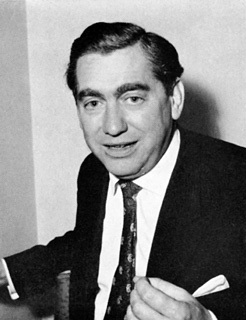
Anthony John Hancock was an English comedian and actor.
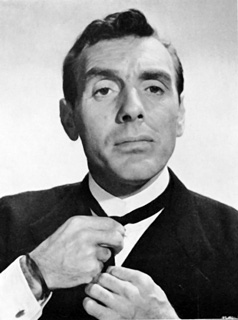
Eric Sykes was an English radio, stage, television and film writer, comedian, actor and director whose performing career spanned more than 50 years. He frequently wrote for and performed with many other leading comedy performers and writers of the period, including Tony Hancock, Spike Milligan, Tommy Cooper, Peter Sellers, John Antrobus and Johnny Speight. Sykes first came to prominence through his many radio credits as a writer and actor in the 1950s, which include collaboration on some scripts for The Goon Show. He became a TV star in his own right in the early 1960s when he appeared with Hattie Jacques in several popular BBC comedy television series.

Paul James Martin, known by the stage name Paul Merton, is an English comedian.

Steptoe and Son is a British sitcom written by Ray Galton and Alan Simpson about a father-and-son rag-and-bone business in 26a Oil Drum Lane, a fictional street in Shepherd's Bush, London. Four series were broadcast by the BBC in black and white from 1962 to 1965, followed by a second run from 1970 to 1974 in colour. The lead roles were played by Wilfrid Brambell and Harry H. Corbett. The theme tune, "Old Ned", was composed by Ron Grainer. The series was voted 15th in a 2004 poll by the BBC to find Britain's Best Sitcom. It was remade in the United States as Sanford and Son, in Sweden as Albert & Herbert, in the Netherlands as Stiefbeen en zoon, in Portugal as Camilo & Filho, and in South Africa as Snetherswaite and Son. Two film adaptations of the series were released in cinemas, Steptoe and Son (1972) and Steptoe and Son Ride Again (1973).

Galton and Simpson were a British comedy scriptwriting duo, who wrote for radio, television and film, consisting of Ray Galton OBE and Alan Simpson OBE. They are best known for their work with comedian Tony Hancock on radio and television between 1954 and 1961 and their long-running television situation comedy, Steptoe and Son, eight series of which were aired between 1962 and 1974, they had an association lasting 60 years.

Raymond Percy Galton was an English radio and television scriptwriter, best known for the Galton and Simpson comedy writing partnership with Alan Simpson. Together they devised and wrote 1950s and 60s BBC sitcoms including Hancock's Half Hour (1954–1961), the first two series of Comedy Playhouse (1961–1963), and Steptoe and Son (1962–1974).
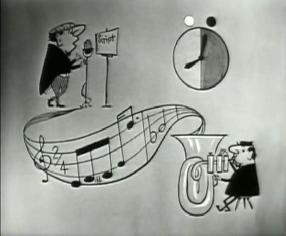
Hancock's Half Hour was a BBC radio comedy, and later television comedy series, broadcast from 1954 to 1961 and written by Ray Galton and Alan Simpson. The series starred Tony Hancock, with Sidney James; the radio version also co-starred, at various times, Moira Lister, Andrée Melly, Hattie Jacques, Bill Kerr and Kenneth Williams. The final television series, renamed simply Hancock, starred Hancock alone.
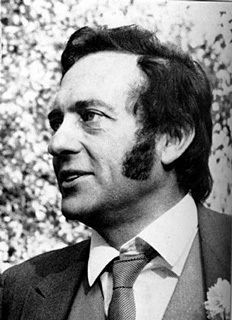
Harry H. Corbett was an English actor and comedian, best remembered for playing rag-and-bone man Harold Steptoe alongside Wilfrid Brambell in the long-running BBC television sitcom Steptoe and Son. His success on television led to appearances in comedy films including The Bargee (1964), Carry On Screaming! (1966) and Jabberwocky (1977).
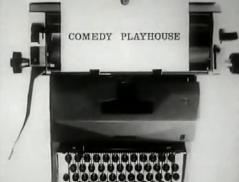
Comedy Playhouse is a long-running British anthology series of one-off unrelated sitcoms that aired for 128 episodes from 1961 to 1975. Many episodes later graduated to their own series, including Steptoe and Son, Meet the Wife, Till Death Us Do Part, All Gas and Gaiters, Up Pompeii!, Not in Front of the Children, Me Mammy, That's Your Funeral, The Liver Birds, Are You Being Served? and particularly Last of the Summer Wine, which is the world's longest running sitcom, having run from January 1973 to August 2010. In all, 27 sitcoms started from a pilot in the Comedy Playhouse strand.
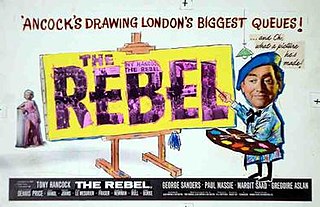
The Rebel is a 1961 British satirical comedy film directed by Robert Day and starring Tony Hancock. It was written by Ray Galton and Alan Simpson. The film concerns the clash between bourgeois and bohemian cultures.
"The Blood Donor" is an episode from the television comedy series Hancock, the final BBC series featuring British comedian Tony Hancock. First transmitted on 23 June 1961, the show was written by Ray Galton and Alan Simpson, and was produced by Duncan Wood. Supporting Hancock were Patrick Cargill, Hugh Lloyd, Frank Thornton, James Ottaway and June Whitfield. It remains one of the best known situation comedy episodes ever broadcast in the United Kingdom.
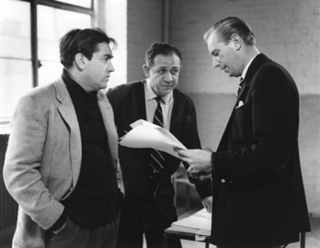
Wilfred Duncan Wood was a British comedy producer, director and writer, who has been described as "the founding father of the British TV sitcom".

The Magnificent Seven Deadly Sins is a 1971 British sketch comedy film directed and produced by Graham Stark. Its title is a conflation of The Magnificent Seven and the seven deadly sins. It comprises a sequence of seven sketches, each representing a sin and written by an array of British comedy-writing talent, including Graham Chapman, Spike Milligan, Barry Cryer and Galton and Simpson. The sketches are linked by animation sequences overseen by Bob Godfrey's animation studio. The music score is by British jazz musician Roy Budd, cinematography by Harvey Harrison and editing by Rod Nelson-Keys and Roy Piper. It was produced by Tigon Pictures and distributed in the U.K. by Tigon Film Distributors Ltd.

Alan Francis Simpson was an English scriptwriter, best known for the Galton and Simpson comedy writing partnership with Ray Galton. Together they devised and wrote the BBC sitcom Hancock's Half Hour (1954–1961), the first two series of Comedy Playhouse (1961–1963), and Steptoe and Son (1962–1974).
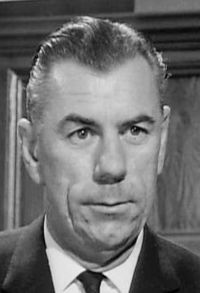
Alister Williamson was an Australian-born character actor, who appeared in many British films and television series of the 1960s and 1970s. A big, craggy-faced man, he would usually be found playing gruff police inspectors or henchmen in adventure series and police dramas of the period. He was also notable as a supporting player in a number of classic British horror films.
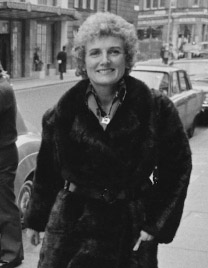
Beryl Frances Vertue was an English television producer, media executive, and agent. She was founder and chairman of the independent television production company Hartswood Films.
"Twelve Angry Men" is an episode of the BBC television situation comedy programme Hancock's Half Hour, starring Tony Hancock and featuring Sid James, and first broadcast on 16 October 1959. Written by Ray Galton and Alan Simpson, the title is retrospectively applied; the episodes were not originally identified separately.
Thomas James Harman Sloan was a British television executive. He was the BBC's Head of Light Entertainment in the 1960s.

Lawrence Geoffrey Stephens was a BBC radio scriptwriter, best remembered for co-writing The Goon Show with Spike Milligan. Stephens was a regular writer of the show for the first two years, and then returned to The Goon Show to assist Milligan. From his association with Milligan, Stephens became involved with Associated London Scripts (ALS), and was said to have been "one of the most eye-catching characters, in the earliest days of the company...he played a significant cameo role in the first phase of success for ALS".
Paul Merton in Galton and Simpson's... is a British comedy television show that ran from 26 January 1996 to 21 October 1997. It stars Paul Merton, re-performing a number of classic comedy scripts written by the duo Galton and Simpson, including some originally written for Tony Hancock. The programme was produced by Central Independent Television for ITV, and aired for 15 episodes in two series.
References
- ↑ Pye-Nixa PLP 1092, Pye NPL 18068, Pye Golden Guinea GGL 0270, Marble Arch MAL 872 (all 12" mono LPs).